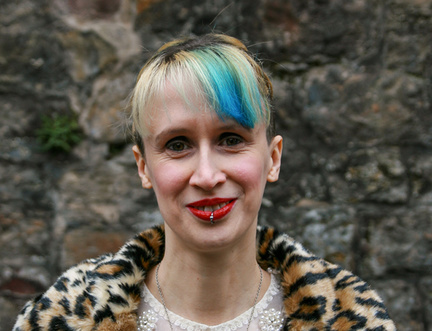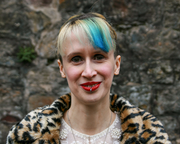What Is To Come
By Ever Dundas

In 2018, we commissioned 51 authors from 25 countries to write essays exploring ideas about freedom for The Freedom Papers, a publication produced in partnership with Gutter Magazine. Read on for Ever Dundas's essay, and visit guttermag.co.uk to purchase a copy of The Freedom Papers.
Freedom is a world without capitalism.
You might think it’s easy for me to write that sentence, especially when I have no duty to produce an alternative. It’s easy to tear down.
But that sentence doesn’t come cheap. We’re born into a society that takes capitalism for granted: what is and was and is to come. It’s eternal. Wading through an imposed lacuna, we find the misery of feudalism, the horrors of socialism gone wrong. The socialists had their chance, we’re told. They failed.
Now?
Capitalism is failing us.
Capitalism is killing us.
Under capitalism, a ‘good’ citizen is a productive citizen, but what if you can’t ‘earn’ a living?
When I fell ill with fibromyalgia I experienced what it means to fall through the cracks of the capitalist system. I experienced the brutality and alienation that lies beneath the words ‘human resources’ and ‘earning a living’.
I was beset by chronic pain, exhaustion, cognitive difficulties. I pushed on, running myself into the ground for an office job I despised, for an institution that only saw me as a number. I was in thrall to a narrative that tells me I’m only worth something if I can pay my way.
It wasn’t enough – I couldn’t make it through sheer force of will (an individualist capitalist myth). I had to give up my job. In pain, exhausted, I dragged myself through the confusing and opaque benefits system.
There are days I’m in so much pain I’ve been literally floored by it, when I’m so exhausted I can barely move. There are days I feel raw and opened up; sensory input (bright light, noise) wears me down. I can’t read, can’t watch TV, can’t string a sentence together. My nerves burn, as if I’m allergic to the world.
But I have good days, good hours – because it’s a fluctuating illness.
The system cannot tolerate this. The system can’t acknowledge the devastating effects of this illness, and the system can’t accept that some days are better than others. While I’m grateful for the good days when I can work or go for a walk, cycle round the park, see friends (all the while hoping these activities don’t cause a flare-up) the system says: you’re not ill enough.
During a humiliating disability assessment, the assessor wrote in the report (which I saw later): ‘Looks well.’ She didn’t once ask me how I felt. Fibromyalgia is called an invisible illness for a reason. They set you up to fail by asking all the wrong questions.
When I was navigating this broken system I naively asked myself why it was like this. The system should be helping people. It shouldn’t be punitive.
I stripped back the layers of bureaucracy and it wasn’t long before I realised: it’s purposefully set up this way, not to catch cheats, but to punish, humiliate, scapegoat, and eradicate. Capitalism is killing us, but this is a utopia for some. To protect their vested interests they need their scapegoats: spewing rhetoric and false promises they turn us on each other. Sporting a veneer of civility and morality, they stoke our prejudice. The government ravages the country and uses us as a distracting sideshow; we shoulder the blame.
We’re living under a Conservative government that’s been investigated by the UN for committing ‘grave’ and ‘systematic violations’ against disabled people, whose welfare reforms have affected disabled people’s lives by hindering ‘their right to live independently and be included in the community’ (UN, 2016). Johanna Hevda (2015) states this is a symptom of capitalism: ‘…to stay alive, capitalism cannot be responsible for our care – its logic of exploitation requires that some of us die.’
We’re given two narratives:
The inspiration porn of Paralympic athletes and other individuals who (we’re told) have made it through their own willpower.
The tragic disabled who live a life of misery, are wheelchair ‘bound’, objects of pity and disgust.
If you don’t fit the first narrative you’re asked: why would you want to live such a miserable life? Why would you want to be an economic burden on the state? Useless mouths consuming our taxes, our hard-earned cash. The only good disabled is the dead disabled.
These narratives don’t allow for society’s failings, for systemic disability discrimination and scapegoating.
I will not be your martyr. I will not die on this capitalist cross.
I will write. I will change the narrative.
I’m a novelist, short story writer, and essayist. I’ve been to literary events from book launches to festivals and back-patting publishing events where I’ve heard publishers talk about diversity. They mention women, LGBT, and people of colour – all progress, and I hope more than lip service. I haven’t once heard anyone mention disabled people. Why is this?
Narratives are important. The dominant negative attitudes towards disabled people aren’t going to change if our culture doesn’t reflect our (varied) lives, if our (multiple) voices can’t be heard. There are many barriers to disabled people working in the publishing industry and these need to be openly discussed and dismantled. Freedom is access. Freedom is having a voice in the public sphere.
*
Is it idealistic to insist no one should have to earn a living, no one should be reduced to a ‘resource’? If so, then I’m idealistic. I’m working the system from the inside (but it’s unstable – most writers struggle to make ends meet, and it’s even harder for disabled writers). I’m paid (sometimes) to imagine, to conjure lies that expose the truths we can’t bear to face. I’m an idealistic dreamer and I know well what it means to accept the status quo. The status quo is not neutral. It’s not eternal. It’s not inevitable.
I’m here with my monstrous regiment, the crips you don’t want to see in the public sphere. We’re here. We hold our idealistic dreams in our hands like flames and we will raze capitalism to the ground. Out of the ashes: rejuvenation ripe with possibility, the freedom of a new beginning.
Copyright © 2018, Ever Dundas. All rights reserved.
Supported by the Scottish Government’s Edinburgh Festivals Expo Fund through Creative Scotland.


 Major new partnership with Celtic Connections
Major new partnership with Celtic Connections 

